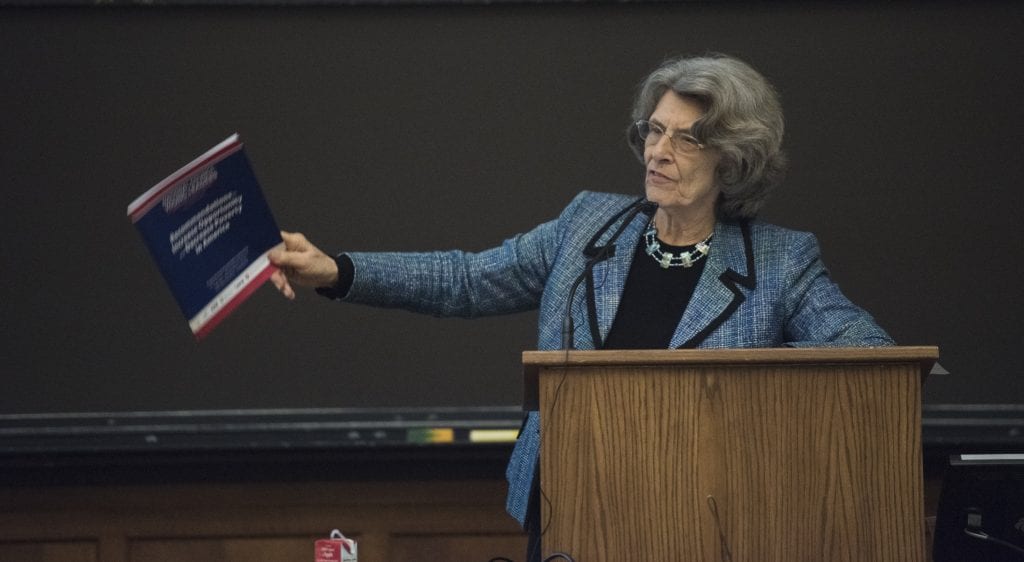Young people from Kansas, Missouri and Illinois gathered to hear Dorothy Stoneman, the founder and CEO of YouthBuild USA Inc., speak about transforming themselves and their communities.
A leader in advocating for youth engagement in civil society and the eradication of poverty, she urged them to work for change while acting consistently with love to build relationships across barriers of race and economics. Change “also depends on our speaking up,” Stoneman said. “Your point of view matters. What you say should be respected.”
Stoneman’s speech on Tuesday, “Beyond Ferguson: Empowering Low-Income Young People to Build the Future of Their Communities,” was co-sponsored by the Center for Social Development 20th Anniversary, Washington University’s Provost Office and the Brown School’s Policy Forum. The event was at the Brown School.
In YouthBuild, people ages 16 to 24 learn job skills while working toward their GEDs or high school diplomas. They build affordable housing for homeless and low-income people in their communities, and the program emphasizes leadership development, community service and the creation of a positive community of adults and youth committed to each other’s success.
In fact, a National Council of Young Leaders nominated by 12 national youth-serving organizations and staffed by YouthBuild USA has written a list of recommendations to increase opportunity and decrease poverty, and Stoneman highlighted their immediate priorities. They include expanding programs that are already succeeding with youth, expanding national service, expanding private internships, increasing all forms of mentorship, protecting and expanding pathways to private education, and reforming the criminal justice system. The full list is in the document “Recommendations to Increase Opportunity and Decrease Poverty in America.”
“We’re going into a presidential election cycle,” she reminded participants. “We want to make sure that there are young people everywhere where those candidates go who are being heard, who are presenting their ideas and are making sure that the candidates understand that low-income young people are going to vote and therefore the candidates have to respond to the issues that they’re laying out.”
Stoneman, who is white, grew up middle class in a healthy, caring community with good schools and nearby parks, she said. As a Girl Scout, she took a pledge to help all people. Then, in 1963, a church was bombed in Birmingham, Alabama. Four girls died. “The Civil Rights Movement woke us up,” Stoneman said. She joined the struggle in 1964—and moved to Harlem. “It changed my life to be imbedded in Harlem for 24 years.”
In 1978, Stoneman began the first YouthBuild program in East Harlem. Today YouthBuild USA is the national support center for more than 265 YouthBuild programs across the nation.
On Tuesday, Stoneman encouraged the audience to take advantage of this time in history. She said she understands the anger that erupted after 18-year-old Michael Brown was killed last August by a Ferguson police officer.
“This is our moment to be heard and to be active,” she said. She urged participants to get informed, to get involved and to vote in this time of increasing concentration of wealth and power. For conditions to change, so must the false belief that poverty is caused by people in poverty, Stoneman said. “They’re pushed into the margins, or lured into the margins,” she said.
“We must provide real opportunities to climb out of poverty,” out of the gangs, off of the streets, she said. Within every heart is the desire to do good, to be good and to find a path to a better future, she said. YouthBuild provides a path through a process of personal and community transformation, Stoneman said. To watch the video of her speech, click here.
During the event, she surprised the audience with a special guest, a graduate of St. Louis YouthBuild—and Brown’s uncle—Leslie McSpadden. He is the brother of Michael Brown’s mother, Lesley McSpadden. Leslie McSpadden recounted that his nephew often said, “One day the world will know my name.”
McSpadden, who is a college student, said YouthBuild transformed his life. “I’m a regular person. I hurt like everybody else hurt, you know what I mean?” Yet, he said, he learned this in YouthBuild: Everything is not about him. “It’s about the future.”
Too many African-American men are entangled in the criminal justice system, McSpadden said. He might have been headed that way, too, he said, but he found YouthBuild. “Today I am a second-year student at Harris-Stowe [State University],” McSpadden said. “My goal is to become an attorney.”
